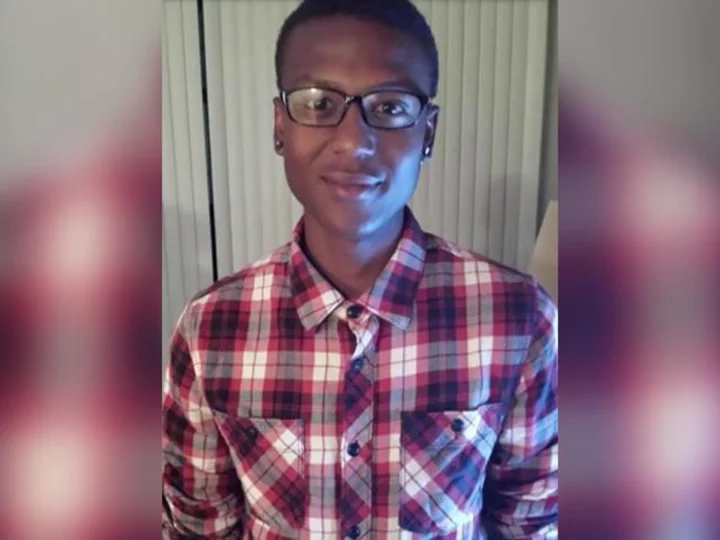Defense attorneys for two police officers in Aurora, Colorado, facing charges in the death of Elijah McClain during a 2019 arrest opted to rest their case in court Friday without calling any witnesses.
Randy Roedema and Jason Rosenblatt have pleaded not guilty to charges of reckless manslaughter, criminally negligent homicide and assault causing serious bodily injury in connection with the 23-year-old's death. Rosenblatt was fired by the Aurora Police Department in 2020 and Roedema remains suspended.
The case stems back to August 24, 2019, when officers responded to a call about a "suspicious person" wearing a ski mask, according to an indictment. The officers confronted McClain, a massage therapist, musician and animal lover, who was walking home from a convenience store carrying a plastic bag with iced tea.
In a disturbing interaction captured on body-camera footage, police wrestled McClain to the ground and placed him in a carotid hold, and paramedics later injected him with the powerful sedative ketamine. He suffered a heart attack on the way to the hospital and was pronounced dead three days later.
In 2021, a grand jury indicted three police officers and two paramedics -- Jeremy Cooper and Peter Cichuniec -- involved in the McClain case. They face 32 counts in total, including reckless manslaughter, criminally negligent homicide and assault. All five have pleaded not guilty.
They will be tried in three separate cases, with the trial of the third officer, Nathan Woodyard, scheduled to begin on Monday. Closing arguments in the trial for Roedema and Rosenblatt are scheduled for Tuesday morning. The paramedics will face a joint trial over their involvement in November.
Prosecutors in the wrongful death trial rested their case Friday morning after more than two weeks of testimony, setting the stage for the defense to begin its case, which was expected to continue for up to a week.
Roedema's attorney had previously indicated he planned to call a police use of force expert as his witness, but both defense teams decided to close their cases Friday afternoon after Judge Mark Warner denied their motion to acquit both men. Roedema and Rosenblatt declined to testify on their own behalf, and neither defense team called a witness.
'He was just walking home,' prosecution says
The trial for the two former officers began on September 20. Prosecutor Jonathan Bunge said in his opening statements, "You will hear no evidence in this case, none, that Elijah McClain did something criminal that night (or) that he was about to engage in criminal activity. He was just walking home."
Bunge took jurors through the night of McClain's interaction with police, narrating video footage from that night. He said three officers were dispatched after a 911 call from a 17-year-old boy who saw McClain walking home from a convenience store and thought it was strange he was wearing a coat and a nylon runner's mask -- something McClain did often because he was frequently cold and liked running, according to Bunge.
The prosecution alleged that during their interaction, Roedema, Rosenblatt and the third officer used excessive force without any proof McClain committed any criminal acts -- despite his repeated attempts to tell them who he was -- and administered two carotid control holds to subdue him.
When the two paramedics arrived, the officers failed to tell them McClain's vital signs had not been checked and he had complained multiple times he couldn't breathe. Instead, they told paramedics he continued to resist and had "crazy strength," Bunge said.
The paramedics diagnosed McClain with "excited delirium," a controversial diagnosis that describes violent agitation, and administered ketamine, CNN has reported.
They injected McClain with a dose based on an estimate that he was 200 pounds; he in fact weighed 143 pounds, according to the indictment.
McClain's death caused by complications from ketamine, coroner said
Defense attorneys for both officers offered a different narrative of the encounter in their opening statements, focusing on the physical resistance the officers said they experienced from McClain.
Roedema's attorney, Reid Elkus, alleged McClain resisted the officers and Roedema saw McClain attempt to grab one of the officers' guns, prompting them to put him on the ground. The prosecution has disputed that McClain reached for a gun, and has said there is no evidence he did so.
The carotid hold, Elkus said, was the only time the officers were able to get McClain to stop resisting. After he was handcuffed, McClain remained responsive, the attorney said.
Defense attorney Harvey Steinberg, who represents Rosenblatt, told jurors Rosenblatt briefly attempted a carotid hold after he heard his colleague say McClain was reaching for a gun as they struggled with him.
McClain's autopsy report was updated in September 2022 in response to new evidence from a grand jury investigation. His cause of death was changed from "undetermined" to "complications of ketamine administration following forcible restraint," Adams County Chief Coroner Monica Broncucia-Jordan wrote in the amended report.
Pathologist Dr. Stephen Cina, who was assisted in the autopsy, said they could not determine whether the carotid hold contributed to McClain's death.
In 2021, the city settled a civil rights lawsuit with the McClain family for $15 million, and both Aurora police and fire departments agreed to a consent decree to address a pattern of racial bias found by a state investigation.

